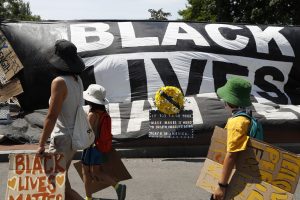It is becoming increasingly difficult for South Koreans from opposite ends of the political spectrum to find common ground. However, both sides are united in their endorsement of the peaceful protests for social justice in cities across the United States.
Widespread public demonstrations sparked by the death of George Floyd at the hands of the Minneapolis Police Department in late May have garnered significant attention in the rest of the world, including South Korea. The story of Floyd’s death as an unarmed, unthreatening African-American killed by police officers is one heard all too often in the United States. In the current context, the tragedy underlines existing structural socio-economic inequality already brought to the fore by COVID-19. Of course, just as integral to the narrative of these Black Lives Matter protests has been the further violence used by police forces to suppress demonstrators, encouraged by U.S. President Donald Trump and senior administration officials. Trump’s endorsement of deploying the military to “dominate the battlespace” – as stated by U.S. Secretary of Defense Mark Esper – on a call to U.S. governors is among the most noticeable examples along these lines that has drawn criticism from pundits and former senior U.S. military officials alike.
Though this story is still ongoing, a cross-sectional reading of editorials from major South Korean newspapers suggests there is general agreement on interpreting what is happening now in the United States. As protests surged in the U.S. last week, so too did South Korean commentary on the issue. Dong-A Ilbo, JoongAng Ilbo, Kyunghyang Shinmun, and Hankyoreh – listed in the order of most conservative to most progressive – all ran editorials on the demonstrations. Several key threads can be found throughout these pieces.
The first is affirmation for Americans taking to the streets and condemnation for Donald Trump. A June 3 JoongAng Ilbo editorial states the protests “are aimed at correcting deeply-rooted racism and structural conflicts. Yet their leader Trump has called the protesters ‘lowlifes and losers’ or even ‘terrorists’ and called for the use of force to stamp out the ‘unlawful’ demonstrations even though many of them are peaceful.” A June 1 Dong-A Ilbo editorial criticized Trump for his mismanagement and stoking the flames of unrest, claiming “The United States is changing from a country that it wants to resemble to a hateful country.” Both Hankyoreh’s June 3 editorial entitled “Trump’s ‘hatred politics’ pour oil on ‘racist anger’” and June 1 commentary on the protests lambast Trump for appealing to his base rather than fostering unity. Additionally, Kyunghyang Shinmun ran a June 3 editorial arguing that the Trump administration has encouraged racism and should never use troops against demonstrators.
The second key idea throughout these pieces is a concern with the international implications of the White House’s response, especially in the context of the intensifying rivalry between Washington and Beijing. COVID-19 has accelerated great power competition and South Korean experts are worried by U.S. initiatives – such as the Economic Prosperity Network – that could be seen as forcing Seoul to choose sides. Dong-A Ilbo lamented the loss of U.S. democratic soft power from Trump’s actions against the backdrop of deteriorating U.S.-China relations. JoongAng Ilbo attributed Trump’s “America First” policies to increased distrust in the international order, which China has used to build influence, adding “American society must regain order and reaffirm its commitment to U.S. values based on freedom, openness and diversity.” Hankyoreh expressed concerns that Trump could try to distract from his mishandling of the protests by taking a tougher stance against China much as he did with the pandemic, worsening relations with Beijing.
One last theme in these editorials is a serious concern for the safety of the Korean-American community. Past instances of protests leading to riots – particularly the 1992 Los Angeles riots – showed the vulnerability of some Korean-American store owners to looting and violence. While all four papers voiced their alarm for Korean-Americans, Kyunghyang Shinmun and Hankyoreh both ran separate editorials calling on the Ministry of Foreign Affairs to use their influence to protect potentially vulnerable Korean-Americans. South Korean reporting in general has emphasized the propensity of the protests to turn violent, with references to riots in many headlines. Some media outlets, though, have called for reframing these views to reflect the overwhelming peaceful nature of the demonstrations, further emphasizing the reality that is recognized in the editorials.
Although more difficult to gauge than the attitudes of major newspapers, there has also at least been some noticeable South Korean public support for the Black Lives Matter movement. A rally was held in Seoul last Saturday in solidarity against racial discrimination in the United States, though only around 100 people reportedly participated. The relatively low turnout could be attributed to COVID-19 concerns, which led another group to hold on an online rally that same day, which 900 people were expected to join.
Perhaps the most notable development to come out of South Korea on the U.S. demonstrations is the backing of K-pop supergroup BTS. The group donated $1 million to Black Lives Matter and within a day their fans collectively matched the amount. However, because of BTS’s global fan base, particularly in the United States, which played a major role in launching the group to superstardom, these donations are not the best indicator of the extent of South Korean public support so far. Nonetheless, BTS and other groups will likely serve as a conduit for constructive dialogue about race in the U.S. and at home in the coming weeks and months.
That South Koreans across the political spectrum are supportive of the Black Lives Matter movement, aligning with the views of the vast majority of Americans, highlights the magnetism between the peoples of the two countries, underpinned by similar values and ideals. Yet anxieties over Donald Trump’s forceful response regretfully underscore existing challenges in the relationship stemming from the White House in an increasingly tenuous regional environment for Seoul.

































